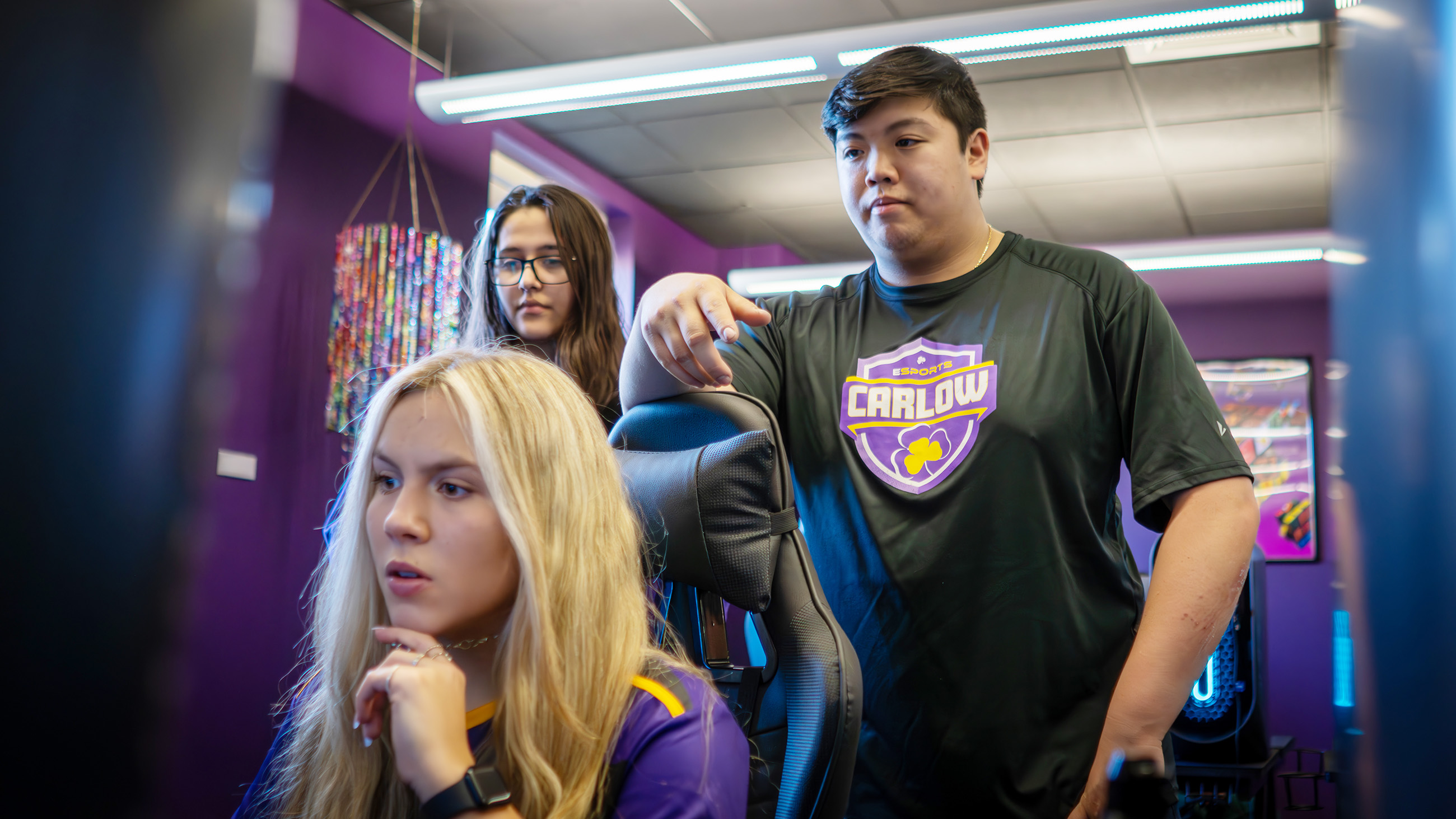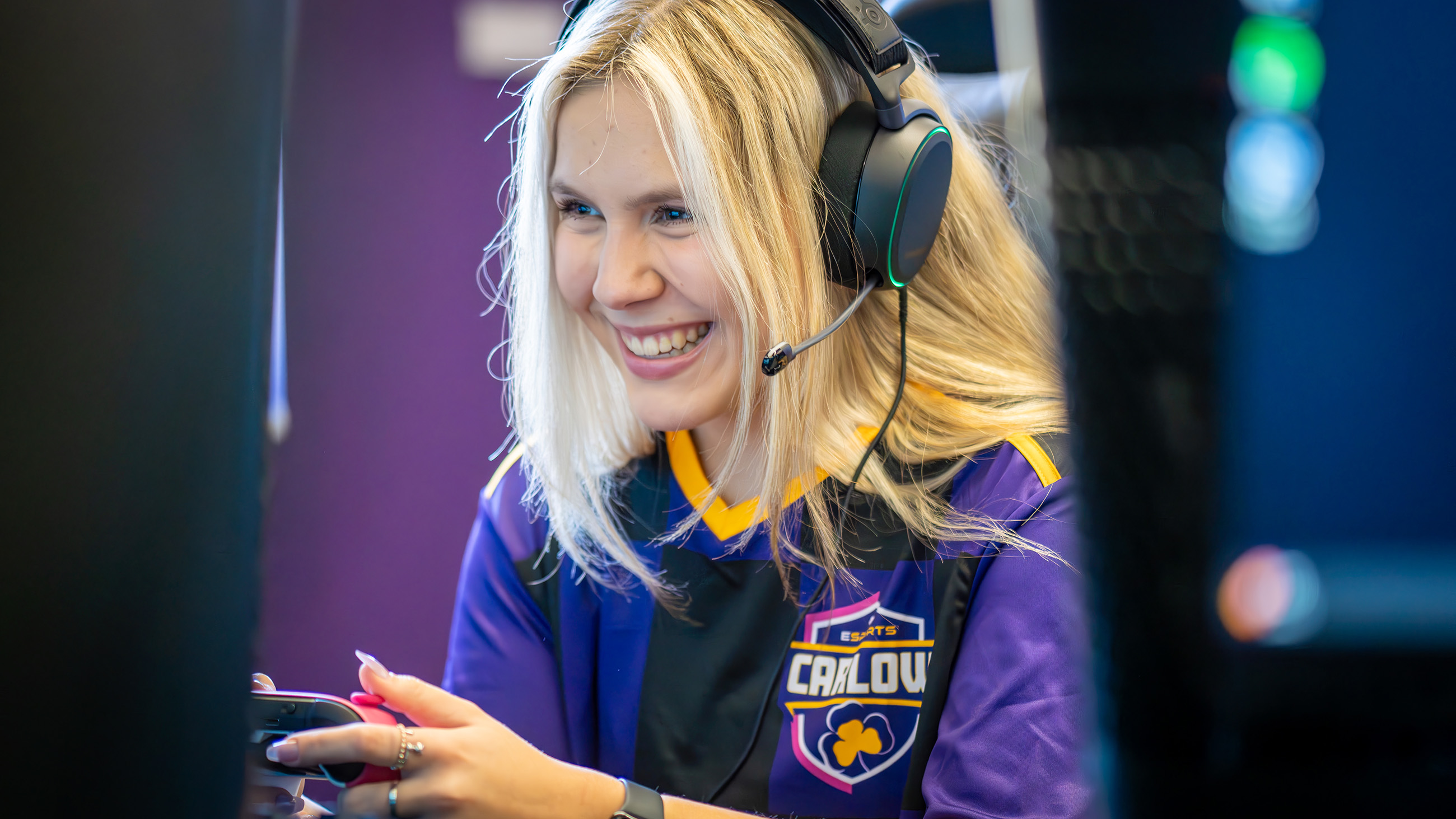
A degree in esports?
When Harrisburg University professor Jennifer Metz Reiss meets with prospective students and their families to talk about the school’s esports academic program, she spends a decent amount of time convincing parents that their kids won’t end up jobless and living in the basement if they pursue an esports career path.
Well, maybe they will live in the basement, she jokes. But she says they have a good shot at employment.
Ms. Metz Reiss leads the university’s esports management, production and performance program. The degree pathway boasts 102 undergraduate students who enrolled for their love of Rocket League and Fortnite and stayed to learn about the intricacies of event planning, business, broadcasting and entertainment technology.
Esports teams have been common on college campuses for years. Now, a growing number of schools are offering esports-related degrees as the $1.72 billion industry is projected to grow to $9.29 billion by 2032. Harrisburg’s academic program was the fourth of its kind in the country.
In the Pittsburgh region, Carlow University in Oakland and West Virginia University have introduced their own esports majors in the past year. Nationwide, schools like Syracuse University, Miami University in Ohio and the University of North Dakota offer esports-related degree programs.
“These are now becoming growth industries,” Ms. Metz Reiss said. “There are definitely jobs and ways to take the skills they’ve learned and translate them to a lot of other careers.”
Students might receive funny looks if they tell friends and relatives that they are majoring in anything esports-related. Ms. Metz Reiss received these looks herself when she left a sports management faculty position in Illinois to head up Harrisburg’s program three years ago.
But she said esports is “a degree for the digital age.” She compared the industry’s growth to baseball in the 1940s or football after television.
So do students earning esports-related degrees spend class time playing video games for hours on end? To the chagrin of some gamers, no. Most of class time is spent AFK (away from keyboard).
Instead, depending on the degree program, these students will learn about event organization, business, marketing, sports management, social media and more — all through an esports lens.
“We’re not playing Fortnite,” said Christopher Scroggins, the director of WVU’s esports program. “We might play video games one day, and that’s just to introduce you to what an esports title would be like. … We’re learning about gross profit margin percentages, and [the students] don’t even know it because they just love esports so much.”
Mr. Scroggins helped launch Shenandoah University’s esports program in 2019. He joined the WVU faculty in 2022 to create the Morgantown school’s esports program. About 18 students are enrolled in the esports business and entertainment major, and another 15-20 are on a path to complete an esports management minor.
WVU’s esports major launched this spring amid the university’s academic transformation — a term school leaders have used to describe program cuts, faculty contract terminations and other big changes as the flagship school grapples with a deficit and enrollment declines. The university will no longer offer world language majors or the only math doctoral program in the rural state.
The addition of majors like esports could perhaps signal that some schools are trying to cater to a diminishing pool of college-aged people who are increasingly skeptical of higher education’s value.
Until he began teaching esports, Mr. Scroggins said he had never taught a course “where students are writing a paragraph at the end of their final thanking [him] for the course.” Esports programs meet students where they’re at and celebrate their passions, Mr. Scroggins believes.
“Everyone in higher ed knows there’s an enrollment cliff. … I think we’re already experiencing it. Enrollment nationwide appears to be down,” Mr. Scroggins said. “WVU was looking for innovative ways to educate prospective learners [and] current learners [with] something that these learners would feel passionate about. … [Esports is] a shiny, new, innovative way to teach traditional concepts.”
About eight students are enrolled in Carlow’s esports business management major. The introduction of the major, which teaches students about business and finances through an esports lens, coincided with the creation of the school’s varsity esports team in fall 2023.
The high-demand nature of the field incentivized Carlow to create the degree, said Tim Phillips, the Catholic school’s vice president of student affairs.
“There aren’t a lot of academic programs specifically with a focus in [esports business], and yet it’s a multibillion dollar industry that has potential for students to engage, not just in game design, but more importantly, businesses are businesses. They need writers, human resource people and accountants. … There’s a lot of different ways students can work in this industry,” Mr. Phillips said.
Mr. Phillips, Mr. Scroggins and Ms. Metz Reiss all stressed the versatile nature of their schools’ esports degrees and the different career options available.
Most obviously, students could work directly in esports management — helping to organize tournaments for high schoolers, college students or adults. They could also pursue work in fields like sports management, production, entertainment, business, communications and hospitality.
Multiple job pathways could be promising as the gaming industry still faces bumps and uncertainty. About 12,000 jobs in the industry were lost in 2023.
That’s something that Safdar Jenkins, a senior at Harrisburg who studies esports management, acknowledged. Mr. Jenkins hopes to someday become a live event manager.
“Doing events builds patience, work ethic, drive and creativity,” Mr. Jenkins, from Camden, N.J., wrote in an email. “Many say that the esports industry is on a decline due to layoffs, controversies and bankruptcies. I believe that on the contrary, esports is still on the rise and this is a rough patch for the industry right now.”
Benjamin Bomberger, a fellow Harrisburg senior studying esports management, wants to become an esports event producer or project manager after he graduates. Mr. Bomberger, from Jonestown, Lebanon County, was raised by two gamers and grew up playing video games. Some of his favorites include The Last of Us, Borderlands and Fortnite.
He has enjoyed his classes and professors at Harrisburg, and believes it’s important for schools to offer majors in this increasingly popular industry.
“When people hear esports and gaming in general, they think you’re sitting at a computer all day and wasting your day away just playing games, but it is completely the opposite,” Mr. Bomberger said. “Take a look at the NFL or NBA or MLB and look at how those traditional sports [are organized] — you need broadcasts, you need to market the games, you need to have a venue to be able to have these games.
“You take all that stuff and put it in esports, and that is essentially what [esports management] is. It is just doing everything behind the scenes, and making it work.”


